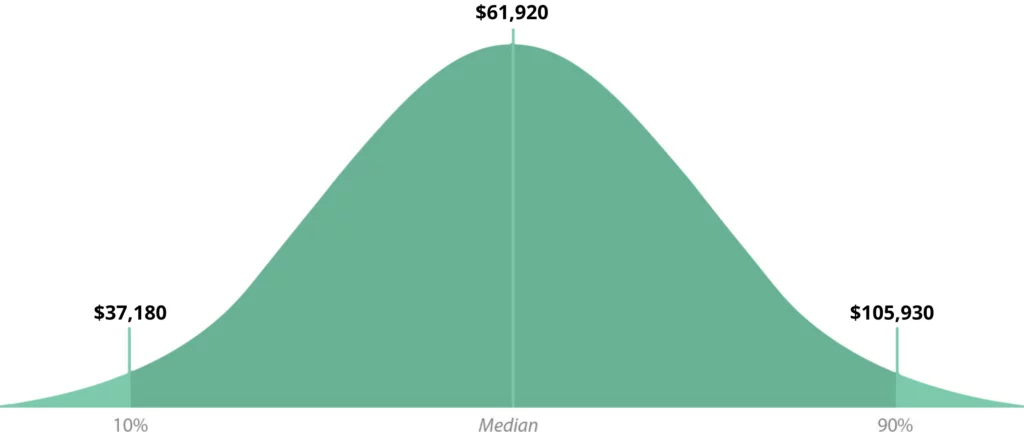
1. Overview: Job Description, Salary, and Career Profile
2. A Comprehensive Guide to Becoming a Human Resources Specialist
3. What Does a Human Resources Specialist Do?
4. Signs You Should Consider Becoming a Human Resources Specialist
5. How Do You Become a Human Resources Specialist?
6. What are the Knowledge and Skills Needed to be a Human Resources Specialist?
7. Popular Schools and Colleges in the U.S. for Aspiring Human Resources Specialists
8. How to Get a Job as a Human Resources Specialist
9. Learn About Geographic and Location Pay Differentials
10. Make Your Resume Stand Out
11. Ace Your Human Resources Specialist Interview
12. Top Online Courses for Aspiring Human Resources Specialists
Human resources specialists made a median salary of $61,920 in 2019. The best-paid 10 percent earned $105,930 that year, while the lowest-paid 10 percent earned $37,180.


Human Resources Managers
Compensation and Benefits Managers
Compensation, Benefits, and Job Analysis Specialists
Labor Relations Specialists
Public Relations Specialists
Customer Service Representatives
Insurance Sales Agents
Training and Development Specialists
Training and Development Managers
Tax Examiners and Collectors
Revenue Agents
Employee relations
Human Resources Management
(HRM) knowledge and expertise
Recruitment and selection
Human Resources Information Software (HRIS)
Communication skills
Organizational skills
Decision-making skills
Training and developmental skills
Budgeting skills
Empathetic skills
Human Resources (HR) Specialists help establish companies by hiring talented and competent employees and, at the same time, keeping them happy in being part of a company. Human resources specialists contribution in a company is undeniable—from recruitment of employees to reinforcing and establishing the culture of an organization—they help with the development of employees in an organization, improving their engagement as well as their productivity.
According to the U.S. Bureau of Labor Statistics, the number of job employment for HR specialists in 2019 is 666,500 and has a projection rate of 7% from 2019-2029, ranking it at #17 in the Best Business Jobs and #93 in 100 Best Jobs based on an article released by the U.S. News.
There are many different job responsibilities an HR specialist does, and those job responsibilities usually fall under five major categories:
Human resources specialists usually work in an office setting mostly during business hours. There may be times that they need to travel and attend job fairs and school campuses to meet potential applicants. However, in general, they are responsible for doing the following:
Because the title of human resources specialist is a rather broad one, it often means different things to different organizations. However, what remains constant throughout is that these HR professionals provide a link between the employer and employees. Their overall goal is to ensure that the best employees are hired for specific positions.
So you find the job responsibilities of an HR specialist interesting and exciting, but you are not sure if this career is right for you. Here are surefire signs that you should consider becoming an HR specialist.
People find you easy to talk to and easy to get along with. They know that when they talk to you about their problems, you won’t judge them. Instead, you listen to them and help them figure out what action they should take. As a result, they are more comfortable opening up to you because they feel at ease, and they trust you.
This trait is important to an HR specialist. If you are approachable, you can build a strong relationship with the employees as well as with your employer. Employees of all different levels should be comfortable approaching you and seek your advice or assistance because you do not take sides.
Another reason why employees approach you for advice is because you are a problem solver. You know how to navigate yourself out of a sticky situation, and you know how to diffuse conflicts when someone is upset or angry.
Dealing with different kinds of people of different personalities is difficult. The HR specialist plays a critical role in dealing with personal and sensitive situations involving people within the company. This is done by using communication skill, empathy, and adhering confidentiality to build a strong foundation of trust. As a result, you are able to pacify the situation and solve problems with diplomacy and delicacy.
Your friends and other people around you go to you to share their secrets, even the most sensitive or classified ones. Additionally, you are not even tempted to share these secrets with anybody.
HR specialists maintain confidentiality as they are the go-to person of employees about health-related issues, legal issues, pay levels, and other concerns of an employee. However, the HR specialist should also know how to balance how to maintain employees’ confidentiality against the situation or information that the management needs to be aware of to be fair on both parties.
You enjoy making connections, exchanging conversation, and getting to know a person more. You are interested to learn what makes people tick and why a person behaves a certain way—you are intrigued by human psychology and sociology.
When a friend asks for your advice on the next action which he/she needs to take; you don’t give answers that are not well-thought. What you do is you weigh the pros and cons to come up with the best resolution.
An HR specialist makes a lot of decisions in a company. That is why they should be a sound decision-maker in evaluating and hiring employees, and also be good in developing compensation packages and benefits for the employees.

In this part of the career guide, you will learn what you need to do to become an HR specialist and what it takes to increase your chances of getting hired and excel in this field. By acquiring the right education, and obtaining experience, you can make your contribution to a business and boost your career as well your earning as an HR specialist.
A bachelor’s degree in human resources, business, or any related field is required to become an HR specialist. Popular coursework often includes: human resources management, business, psychology, professional writing, industrial relations, and accounting. The available degree programs are:
An associate degree in HR management is the minimum level of education an aspiring HR specialist can take to get into an entry-level job position. It is a two-year program that develops the foundation of the basic knowledge of human resources management. Associate degree holders often work as:
The bachelor’s degree program in HR management is equipped with the important tools and programs that usually outline the principles of human resources, standards, practices, businesses, and other related programs. You will also be provided with training in areas of human behavior, labor relations, accounting and finance, and marketing.
Earning a bachelor’s degree will qualify you to land a job position as:
Bachelor of Science (BS) focal point is in science and math classes. Some social studies and English classes will also be included, while the science classes are more heavily toward accounting, economics, and psychology.
Bachelor of Arts (BA) main focus is in social studies, history, liberal arts, and other conventional studies. A little science and math classes will also be compulsory.
Business Administration (BBA) programs center on business topics such as finance, business communications, and accounting.
Just like the human resources specialist certification program, the post-degree certificate in HR management gives a bachelor degree holder in any field a chance to obtain the essential skills to be in the HR management field. This means that you don’t need to go back and take a bachelor’s degree in human resources and other related fields.
Human resources certificate programs are subsets of bachelor’s and master’s degree programs. Obtaining certificate courses will prove your HR knowledge and training in the field. It also demonstrates your credibility, dedication, and expertise in human resources principles to your employer, employees, peers, and other HR specialists around the globe.
You may choose from the following human resources designation for your professional certification in HR:
Levels of professional certification:
Levels of professional certification:
Levels of professional certification:
A master’s degree in human resources improves your earning potential as it provides you with the skills and knowledge to take on the supervisory level. Taking a master’s degree is time-consuming and a bit expensive, but if you completed this, aside from earning more, you would also reap other rewards like:
Human resources interns are usually students or fresh graduates who work in a company’s HR department to grow their experience to build their resumes. They are often paid or provided with academic credit. They provide assistance to the HR department working directly under the supervision of an HR manager to complete various tasks such as posting jobs, evaluating resumes, performing interviews, and providing support with salary negotiation. It allows students to harness their skills and knowledge by gaining first-hand exposure to what HR specialists do in the real work setting.
The following are the important skills every HR specialist should have.
One role of an HR specialist is to maintain a solid working relationship between the employee and the employer. By doing this, the employees are likely to be more engaged in their work and become more loyal to the employer. They may sometimes act as liaison officers or mediators between employees and managers to avoid disputes by resolving problems and by assisting with the implementation of policies for a more harmonious workplace.
HRM knowledge and expertise are some of the important requirements in every HR specialist. These are sets of principles of human resources management. This function focuses on the three (3) major responsibilities of an HR specialist:
Hence, these responsibilities will solve the related issue regarding employee performance management, motivation, wellness, safety, benefits, and other organization development. If done correctly, it will provide direction in accomplishing the company’s goals and objectives.
Recruitment is the searching of candidates with the necessary experience, skills, and knowledge to fill-in a job vacancy in an organization. The main focus of recruitment is to get a pool of applicants that are the best fit in a position.
Selection is the process of identifying who are the appropriate candidates through the recruitment process. This includes interviewing, background checking, and assessment. This process is used to ensure that the perfect candidate will get appointed for the role.
Recruitment and selection is one of the most important functions of an HR specialist because it has a major impact in a business. The contribution of an employee is vital in the growth of a business. Hiring inefficient or wrong employees is like not hiring at all because the candidates failed to deliver what was expected from them and did not generate revenue in a business.
Human Resources Information Software (HRIS) is an important tool for HR specialists to manage their workload and workforce efficiently by allowing HR-related activities and processes to take place electronically. It is software for businesses that help HR specialists perform accounting, management, and payroll. Thus, increase their efficiency in coming up with decisions in HR that also have an effect on the productivity for employees and employers.
Communication skills are important on both written and oral so that they can clearly express their thoughts. HR specialists deal with a lot of people every day. They listen to the employees’ concerns and give advice whether the concern is work-related or personal. These tasks call for listening and oral skills. HR specialists are also responsible for the creation of policies, memos, emails, and handbooks, which means that they should have impeccable writing skills.
Choosing the right school to get your education in the human resources field is a crucial step for students in their career paths. One common problem of students in choosing a school is that they base their decision on emotions without thinking or scrutinizing what the school has to offer for their students. There are a lot of factors that a student should consider when choosing a school such as cost, location, quality of education, major options, campus safety, and other factors that are important to you. Here is a list of the top 50 best colleges for aspiring human resources specialists:
You can also check college factual for the complete list of top-ranked human resources management colleges in the U.S.

Job hunting is tough, whether you are a fresh graduate or an experienced professional in any field. To help you with your job search in a smarter approach, here are some tips that you can use to nail a job application.
Finding job listings using job search engine sites is the easiest way to find a job. You can instantly find what job positions are available in the market, discover new companies and find out how much they offer for the job position. Here is a list of the top job search engines in the U.S.
This method is used to build relationships that will open doors for you for job opportunities, and it is a great way to get to know other HR specialists and talk to them about your job search. They may either give you support, advice, or even refer you to companies.
Being part of HR management associations or organizations is another way of building your network. You will also have a chance to learn the latest HR trends, HR regulations, tips to become successful working in HR departments and find new job listings.
Internships will help you to get experience in the practical work background of an HR specialist before you enter the real job market. This will also help you decide if the career path is right for you. Here are other reasons why you should try becoming an intern:
Geographic areas often have location pay differentials, making a significant impact on your potential earnings. Some states offer a higher salary and some with a lower wage to HR specialists.
Here’s a list of the average mean of annual revenues of HR specialists in every state according to the latest data from the Bureau of Labor Statistics’ Occupational Employment Statistics dated 2019:
| State | 2019 Mean Annual Wage |
|---|---|
| Washington | $77,220 |
| New Jersey | $76,380 |
| California | $76,200 |
| New York | $76,170 |
| Massachusetts | $75,900 |
| Virginia | $75,810 |
| Maryland | $75,310 |
| Rhode Island | $74,340 |
| Connecticut | $73,330 |
| Colorado | $70,900 |
| Alaska | $68,810 |
| Pennsylvania | $67,790 |
| Texas | $67,650 |
| Minnesota | $67,600 |
| Hawaii | $67,560 |
| Delaware | $66,950 |
| North Carolina | $65,970 |
| Arizona | $64,280 |
| Illinois | $63,890 |
| New Hampshire | $63,830 |
| Idaho | $63,810 |
| Missouri | $63,750 |
| Ohio | $63,460 |
| Maine | $62,660 |
| North Dakota | $62,420 |
| State | 2019 Mean Annual Wage |
|---|---|
| Oregon | $62,380 |
| Georgia | $62,340 |
| Michigan | $62,290 |
| Wisconsin | $61,700 |
| Vermont | $61,670 |
| Alabama | $61,660 |
| Kansas | $61,660 |
| South Carolina | $61,350 |
| West Virginia | $60,430 |
| Nevada | $60,180 |
| New Mexico | $59,510 |
| Iowa | $59,400 |
| Florida | $58,890 |
| Kentucky | $58,440 |
| Indiana | $58,130 |
| Arkansas | $57,740 |
| Wyoming | $57,600 |
| Tennessee | $57,150 |
| Nebraska | $56,960 |
| Montana | $56,690 |
| Oklahoma | $56,570 |
| South Dakota | $56,110 |
| Utah | $56,100 |
| Louisiana | $55,530 |
| Mississippi | $53,250 |
Report from the Bureau of Labor Statistics
As an HR specialist, you have probably reviewed a lot of resumes throughout your career. However, writing your own resume can be quite a challenge. There are resume guidelines that you could follow for you to come up with your own well-crafted resume that will showcase your greatest achievements and traits and will add value to you as a candidate.
A resume headline or a branding statement is a 1-2 sentence statement that will captivate a potential employer by highlighting your most important expertise, key qualifications, experiences, exceptional qualities, and knowledge that sets you apart from the rest of the candidates.
This information is valuable in a resume. It helps the potential employer understand how valuable and experienced you are by providing details where you have worked. This should include:
This section in your resume demonstrates to the employer that you are an achiever who will add value to their business. This is because they know what you have done from your previous companies and how you can contribute and be the best in their company.
As an HR specialist, you probably already know the importance of adding keywords in a resume. If you fail to include this, you will be perceived as an unqualified candidate, and your resume might even not make it to the recruitment process. Thus, it is pivotal to include resume keywords for HR within your resume, cover letter, Linkedin profile, follow-up letters, and even during your interview.
Interviews should not be taken lightly because this is an important step in landing a job. Being prepared for an interview will help you feel more confident and appear calm in front of your prospective employer. The best way to prevent fumbling and being caught off-guard is to be prepared for all types of possible questions. Here are some practice interview questions to help you:
Show the interviewer your passion and excitement with your job by discussing why you love your career without sounding too cliché. You can tell the interviewer that you love meeting people, getting to know them, helping others, and making an impact on their lives.
Treat your candidates the way you want to be treated—and this is with respect. They may not be competent at the present, but they might be the exact candidate who you will need in the future. Most of us have experienced getting rejected, so even if you will not hire a candidate, still give them your full attention, enthusiasm, and respect during the interview process so that they will still like to work at your company even if they don’t get hired today.
The job of an HR specialist is exciting and, at the same time, though. You need to deal with different personalities and different issues. In answering this question, you should be honest and specific without ruling yourself out as a candidate. There are different ways to answer this question, but the safest yet equally impactful answer is highlighting solvable challenges. You can give a difficult situation even if you have not experienced it yet and explain how you can overcome the challenges using the fundamental strengths that you have in your role.
The interviewer wants to know why you will be a good fit for the position, what inspires you, and what you look forward to in the position. The best approach for this question is to think what you enjoyed the most about your last job or your experience in the HR department and how the current position you are applying for is similar or better than your previous job/s.
Terminating an employee is not an easy task, and HR specialists play a significant part in the termination of an employee –that is to minimize the possible damage to both employer and employee. To answer this question, you can demonstrate to the interviewer the necessary steps you need to take before, during, or after the employee termination. These usually include:
Skills Success has carefully curated and organized thousands of online video courses. Start your journey to becoming an HR specialist with these top online courses.






